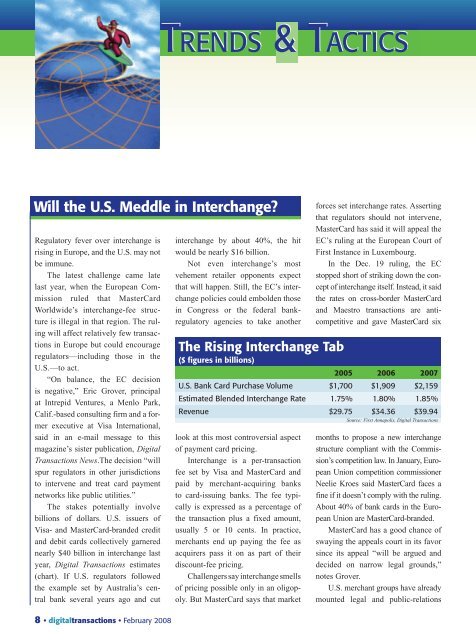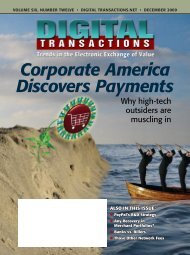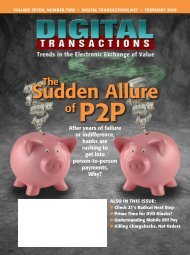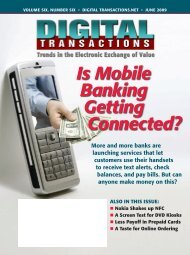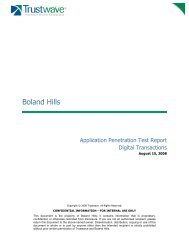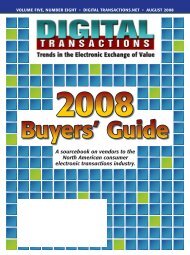The Broken Link - Digital Transactions
The Broken Link - Digital Transactions
The Broken Link - Digital Transactions
Create successful ePaper yourself
Turn your PDF publications into a flip-book with our unique Google optimized e-Paper software.
TRENDS & TACTICS<br />
TRENDS & TACTICS<br />
Will the U.S. Meddle in Interchange?<br />
Regulatory fever over interchange is<br />
rising in Europe, and the U.S. may not<br />
be immune.<br />
<strong>The</strong> latest challenge came late<br />
last year, when the European Commission<br />
ruled that MasterCard<br />
Worldwide’s interchange-fee structure<br />
is illegal in that region. <strong>The</strong> ruling<br />
will affect relatively few transactions<br />
in Europe but could encourage<br />
regulators—including those in the<br />
U.S.—to act.<br />
“On balance, the EC decision<br />
is negative,” Eric Grover, principal<br />
at Intrepid Ventures, a Menlo Park,<br />
Calif.-based consulting firm and a former<br />
executive at Visa International,<br />
said in an e-mail message to this<br />
magazine’s sister publication, <strong>Digital</strong><br />
<strong>Transactions</strong> News.<strong>The</strong> decision “will<br />
spur regulators in other jurisdictions<br />
to intervene and treat card payment<br />
networks like public utilities.”<br />
<strong>The</strong> stakes potentially involve<br />
billions of dollars. U.S. issuers of<br />
Visa- and MasterCard-branded credit<br />
and debit cards collectively garnered<br />
nearly $40 billion in interchange last<br />
year, <strong>Digital</strong> <strong>Transactions</strong> estimates<br />
(chart). If U.S. regulators followed<br />
the example set by Australia’s central<br />
bank several years ago and cut<br />
8 • digitaltransactions • February 2008<br />
interchange by about 40%, the hit<br />
would be nearly $16 billion.<br />
Not even interchange’s most<br />
vehement retailer opponents expect<br />
that will happen. Still, the EC’s interchange<br />
policies could embolden those<br />
in Congress or the federal bankregulatory<br />
agencies to take another<br />
<strong>The</strong> Rising Interchange Tab<br />
($ figures in billions)<br />
look at this most controversial aspect<br />
of payment card pricing.<br />
Interchange is a per-transaction<br />
fee set by Visa and MasterCard and<br />
paid by merchant-acquiring banks<br />
to card-issuing banks. <strong>The</strong> fee typically<br />
is expressed as a percentage of<br />
the transaction plus a fixed amount,<br />
usually 5 or 10 cents. In practice,<br />
merchants end up paying the fee as<br />
acquirers pass it on as part of their<br />
discount-fee pricing.<br />
Challengers say interchange smells<br />
of pricing possible only in an oligopoly.<br />
But MasterCard says that market<br />
forces set interchange rates. Asserting<br />
that regulators should not intervene,<br />
MasterCard has said it will appeal the<br />
EC’s ruling at the European Court of<br />
First Instance in Luxembourg.<br />
In the Dec. 19 ruling, the EC<br />
stopped short of striking down the concept<br />
of interchange itself. Instead, it said<br />
the rates on cross-border MasterCard<br />
and Maestro transactions are anticompetitive<br />
and gave MasterCard six<br />
2005 2006 2007<br />
U.S. Bank Card Purchase Volume $1,700 $1,909 $2,159<br />
Estimated Blended Interchange Rate 1.75% 1.80% 1.85%<br />
Revenue $29.75 $34.36 $39.94<br />
Source: First Annapolis, <strong>Digital</strong> <strong>Transactions</strong><br />
months to propose a new interchange<br />
structure compliant with the Commission’s<br />
competition law. In January, European<br />
Union competition commissioner<br />
Neelie Kroes said MasterCard faces a<br />
fine if it doesn’t comply with the ruling.<br />
About 40% of bank cards in the European<br />
Union are MasterCard-branded.<br />
MasterCard has a good chance of<br />
swaying the appeals court in its favor<br />
since its appeal “will be argued and<br />
decided on narrow legal grounds,”<br />
notes Grover.<br />
U.S. merchant groups have already<br />
mounted legal and public-relations


